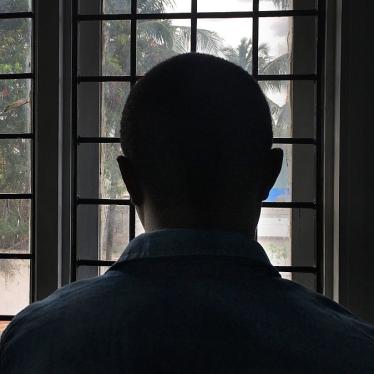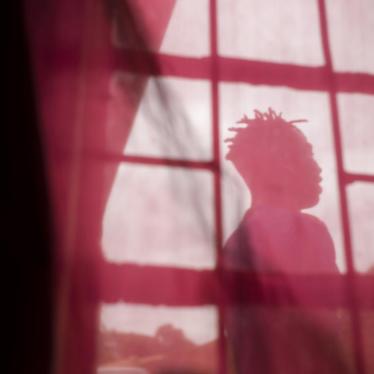(Johannesburg) - The March arrest, conviction, and sentencing of Roger Jean-Claude Mbede (no relation to the journalist Jean-Claude Mbede resident of Italy) to three years in prison for being homosexual is a gross violation of Mbede's rights to freedom of expression and equality guaranteed by the Cameroonian constitution, Alternatives-Cameroun, Association pour la Defense de l'Homosexualitè (ADEFHO), and Human Rights Watch said in a letter to Cameroon's top leaders.
Under section 347 bis, a person who engages in "sexual relations with a person of the same sex" can face a prison term of up to five years. Mbede was sentenced after admitting to his sexual orientation while in police custody. However, the law directly contravenes international human rights treaties, which, the Cameroonian constitution states, apply directly in the country.
"This law criminalizes consensual sexual conduct and violates the fundamental rights to privacy, equality, and freedom of expression of all Cameroonians," said Alice Nkom of ADEFHO. "The fear and stigma attached to homosexuality is such that the police use the mere existence of the law to trap individuals with impunity. And courts convict those accused even in the absence of evidence."
In their letter, ADEFHO, Alternatives-Cameroun, and Human Rights Watch urge Vice Prime Minister and Minister of Justice Hon. Amadou Ali to initiate a review of the law criminalizing consensual sexual conduct and the conviction in this case, and call on the General Delegate of Security Martin Mbarga Nguélé and the Secretary of State for Defence Jean Baptiste Bokam to cease arrests under section 347 bis of the Cameroonian penal code.
Background
Mbede sent an acquaintance a text message and arranged to meet him on March 2, 2011. When he arrived at the designated meeting place, he found his acquaintance in the company of policemen, who took him into custody. The police questioned Mbede who admitted that he was homosexual. Cameroonian law dictates that a person cannot be held in custody for longer than 48 hours without being charged. Mbede was held for seven days at the Gendarmerie du SED Yaoundé before he was charged and transferred to Yaoundé Central Prison.
Mbede made three appearances at the Court of First Instance in Yaoundé and on April 28, he was found guilty and sentenced to three years in prison. Mbede is currently serving his sentence at Yaoundé Central Prison. Cameroonian activists say that Mbede faces threats to his physical safety in prison because of his sexual orientation.
"The Cameroonian criminal justice system is failing to uphold basic rights," Yves Yomb of Alternatives-Cameroun. "In other cases, an accusation from a third party suffices as ‘evidence.' The existence of this law and its use with such impunity makes a mockery of civil liberties in the country."
In 2010, four human rights organizations, including ADEFHO, Alternatives-Cameroun, and Human Rights Watch, jointly published a report documenting the many violations of fundamental rights faced by lesbians, gay men, and bisexual people in Cameroon. The report exposes arbitrary detention, scant regard for due process, and sentencing without evidence under section 347 bis. The report documents abuses in detention, both pre-trial and in prison, by police and prison personnel, including beatings, torture, and verbal abuse. Even written complaints by prisoners about abuse from guards receive no response from the authorities.
Prison authorities often inform other inmates about the presumed sexual orientation of individuals incarcerated under section 347 bis. This results in constant threats, violence, and insults against such prisoners. The report documents cases in which inmates presumed to be homosexual have been physically beaten as well as sexually assaulted by other inmates, with prison personnel failing to protect them and even encouraging such violence.
Prison authorities provide no materials or information about safer sex in prison despite the fact that coerced as well as voluntary sexual activity takes place among inmates. Despite the government's stated commitment to including men who have sex with men in Cameroon's HIV and AIDS national strategy, conditions in prison are such that not only is the risk of HIV transmission among inmates high, but also that HIV positive inmates often receive no treatment while in prison, which places their lives at extreme risk.
"A prison term can be life-threatening for inmates, particularly those who are presumed to be homosexual," said Dipika Nath of the Lesbian, Gay, Bisexual and Transgender Rights Program at Human Rights Watch. "Cameroon's police, judges, and other government officials are allowing their prejudices against lesbians and gay men to override legal standards they have sworn to uphold."
ADEFHO, Alternatives-Cameroun, and Human Rights Watch said that section 347 bis and the abuses faced by individuals because of their presumed or actual sexual orientation and gender expression violate rights enshrined in the International Covenant on Civil and Political Rights and the African Charter on Human and Peoples' Rights, which Cameroon acceded to on June 27, 1984, and June 20, 1989, respectively. These rights include the rights to privacy; health; freedom from arbitrary arrest and detention; protection against torture and inhuman and degrading treatment; freedom of expression, association, and information; non-discrimination and equal protection of the law; the rights of prisoners in detention; and the rights of women.
The constitution of Cameroon affirms its "attachment to the fundamental freedoms enshrined in the Universal Declaration of Human Rights... the African Charter on Human and Peoples' Rights, and all duly ratified international conventions...."







